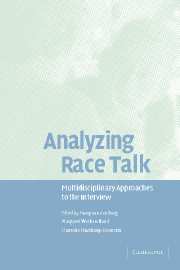Book contents
- Frontmatter
- Contents
- List of contributors
- Preface
- Acknowledgments
- Transcriptions symbols
- Introduction
- 1 Racism and the analysis of cultural resources in interviews
- 2 Analyzing racial discourse: the discursive psychology of mind–world relationships
- 3 Constructivist processes in discourse: a cognitive linguistics perspective
- 4 Institutional, professional, and lifeworld frames in interview talk
- 5 The uses of absurdity
- 6 Multiple voices in talking race: Pakeha reported speech in the discursive construction of the racial other
- 7 Contradictions in interview discourse
- 8 Racism, happiness, and ideology
- 9 The frame analysis of research interviews: social categorization and footing in interview discourse
- 10 Affiliation and detachment in interviewer answer receipts
- 11 Interviewer laughter as an unspecified request for clarification
- 12 Perspectives and frameworks in interviewers' queries
- Appendix: Interview transcripts
- Index
4 - Institutional, professional, and lifeworld frames in interview talk
Published online by Cambridge University Press: 22 September 2009
- Frontmatter
- Contents
- List of contributors
- Preface
- Acknowledgments
- Transcriptions symbols
- Introduction
- 1 Racism and the analysis of cultural resources in interviews
- 2 Analyzing racial discourse: the discursive psychology of mind–world relationships
- 3 Constructivist processes in discourse: a cognitive linguistics perspective
- 4 Institutional, professional, and lifeworld frames in interview talk
- 5 The uses of absurdity
- 6 Multiple voices in talking race: Pakeha reported speech in the discursive construction of the racial other
- 7 Contradictions in interview discourse
- 8 Racism, happiness, and ideology
- 9 The frame analysis of research interviews: social categorization and footing in interview discourse
- 10 Affiliation and detachment in interviewer answer receipts
- 11 Interviewer laughter as an unspecified request for clarification
- 12 Perspectives and frameworks in interviewers' queries
- Appendix: Interview transcripts
- Index
Summary
Introduction
This chapter, like other contributions to this volume, is concerned with the interpretive procedures surrounding interview talk. In focusing on interpretive procedures, I have a two-fold focus: (1) how interviewers and interviewees as participants jointly accomplish the interview activity by taking on questioner and answerer identities, and (2) what inferencing resources are available to discourse analysts in order to make sense of the interaction order. In other words, my discussion will center around the accounting practices of participants vis-à-vis the sense-making practices of discourse analysts in their warranting and backing of claims. For analytic scrutiny, the interactional and interpretive framing of the interview activity (i.e., the how) is as important as the range of topics that is being talked about (i.e., the what). Equally, in the context of this volume, it is relevant to keep separate the participants' and analysts' interpretive procedures as far as practicable, while also acknowledging the fact that the researcher-interviewer who participated in the interview activity, unlike the discourse analyst(s) examining the transcripts, occupies the position of a participant-analyst.
At first sight, it may appear that research interviews, by definition, are designed to access informants' lifeworld experiences in a structured manner. The participants, interviewer and interviewee, use the interactional resources available to them to seek/formulate opinions on specific topics (here racism, multiculturalism, etc.). The primacy of the question-answer format is indicative of the structural organization of the interview activity.
- Type
- Chapter
- Information
- Analyzing Race TalkMultidisciplinary Perspectives on the Research Interview, pp. 64 - 84Publisher: Cambridge University PressPrint publication year: 2004
- 8
- Cited by



